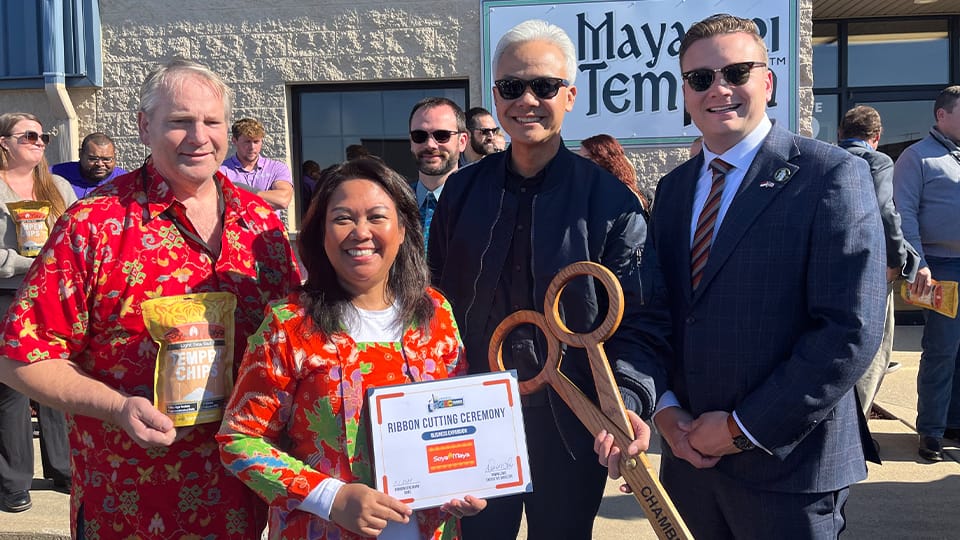Indonesian restauranteur growing tempeh operations with expanded Greensburg facility
Subscriber Benefit
As a subscriber you can listen to articles at work, in the car, or while you work out. Subscribe Now
The owner of an Indonesian restaurant in Greensburg is growing her operations with the expansion of a tempeh factory in the Decatur County city.
Mayasari Effendi, a native of Indonesia who opened Mayasari Indonesian Grill in 2012, cut the ribbon earlier this month on the new facility for Mayasari Tempeh, which makes fresh frozen tempeh as well as tempeh protein chips under the Soya Maya brand name.
Effendi has invested over $500,000 to more than double the company’s production space and add a small number of jobs.
Tempeh is a traditional Indonesian food made from fermented soybeans, and the company is using locally sourced soybeans from nearby farmers in Decatur County.
Effendi told Inside INdiana Business that the move to produce tempeh beyond her restaurant started as a result of the COVID-19 pandemic.
“When COVID came, suddenly a lot of people were asking about tempeh; they just realized they want to eat something healthy,” Effendi said. “So, in 2021 I went from making tempeh from just two or three kilograms of soybeans to almost one bushel.”
Effendi said she quickly ramped up production, using more than a dozen bushels of soybeans to make her tempeh products, which is now about 600 bags of tempeh a week.
In addition to the expanded facility, Mayasari Tempeh received a revolving loan from the Economic Development Corp. in Greensburg to acquire a new tempeh chip processor, which slices, cooks and bakes her tempeh protein chips all at once instead of doing everything by hand.
“To make tempeh chips, it’s harder than tempeh,” Effendi said. “Tempeh itself is like a scientific process, and then here with tempeh chips, it’s double challenging. So, to get this result, I started using my hands to cut them and then deep fried them within our facility in the restaurant.”
According to the Greensburg Decatur County Chamber of Commerce, the new equipment will allow the company to dramatically increase production of the chips from 200 bags to 5,500 bags per week.
Effendi said she is currently searching for partners to expand sales and distribution of her products to more locations around the state and the Midwest.
Indonesian connections
The Indiana Soybean Alliance says Effendi has been key to making connections with the Indonesian market, which goes through nearly 3 million tons of soybeans each year, the vast majority of which is imported from the Midwest.
The ribbon cutting for Mayasari Tempeh’s new facility was attended by Ganjar Pranowo, former Governor of Central Java, a province in Indonesia, which the chamber said highlighted the strong cultural and economic ties between Indonesia and the Indonesian-American community.
Ed Ebert, senior director of market development for the Indiana Soybean Alliance, said Effendi has joined several trips to the country, including one earlier this year, and helped make those connections, especially because of her knowledge of how tempeh is produced.
“The fact that she’s very familiar and expert in that traditional process of making tempeh is also a big benefit in terms of talking about quality and how important the high-quality beans are to that process,” Ebert said. “The fact that she also has significant connections inside of Indonesia, both in commercial connections and also within the government there, is also significant.”
For Effendi, supporting people in Indonesia is an important part of her business as well. For each bag of Soya Maya tempeh chips sold, the company donates 5 cents to support children’s education in Indonesia.
“Five cents, maybe it’s not big for us here, but for the children there it will last forever, because education is very important to step up from poverty into a better life,” she said. “I do believe the farmers around us are supporting this movement.”
Supporting local soybean farmers
Effendi has established relationships with farmers in the surrounding area in Decatur County to provide the soybeans needed for Mayasari Tempeh. Ebert said the farmers have a sense of pride that they’re contributing to a local business.
“I think the people that are supplying Maya beans in her local market area there in Greensburg are very proud of that fact that their soybeans are finding a new use, directly into human food consumption, which is always something that the Indiana Soybean Alliance, is looking for,” he said.
In addition to using soybeans to make her tempeh products, Effendi uses high-oleic soybean oil to fry her tempeh chips.
Indiana is the No. 1 producer of high-oleic soybeans in the world, according to the alliance, and the soybean oil is growing in demand in the food industry because of its health benefits; the oil has zero grams of trans-fat per serving, 20% less saturated fat than conventional soybean oil and is high in heart-healthy monounsaturated fat.
“It’s a very important product to Indiana farmers,” Ebert said. “So it’s a great story for us to be able to tell back to farmers about how, although it’s a small-volume use, it’s definitely a new use here in Indiana and the U.S.”
Effendi said because of the local connections and the support from the Indiana Soybean Alliance, the potential for growth for Mayasari Tempeh is very high.
